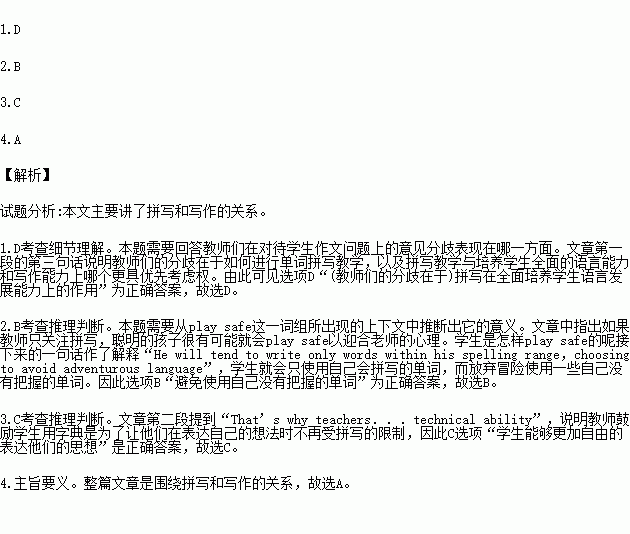题目内容
阅读理解
There is a popular belief among parents that schools are no longer interested in spelling. No school I have taught in has ever ignored spelling or considered it unimportant as a basic skill There are, however, vastly different ideas about how to teach it, or how much priority it must be given over in general language development and writing ability. The problem is, how to encourage a child to express himself freely and confidently in writing without holding him back with the complexities of spelling?
If spelling becomes the only focal point of his teacher's interest, clearly a bright child will be likely to "play safe". He will tend to write only words within his spelling range, choosing to avoid adventurous language. That's why teachers often encourage the early use of dictionaries and pay attention to content rather than technical ability.
I was once shocked to read on the bottom of a sensitive piece of writing about a personal experience: "This work is terrible! There are far too many spelling errors and your writing is illegible." It may have been a sharp criticism of the pupil's technical abilities in writing, but it was also a sad reflection on the teacher who had omitted to read the essay, which contained some beautiful expressions of the child's deep feelings. The teacher was not wrong to draw attention to the errors, but if his priorities had centered on the child's ideas, an expression of his disappointment with the presentation would have given the pupil more motivation to seek improvement.
1.Teachers differ in their opinions about ________.
A. the difficulties in teaching spelling
B. the necessity of teaching spelling
C. the complexities of the basic writing skills
D. the role of spelling in general language development
2.The expression "play safe" probably means “_______”.
A. to write carefully
B. to avoid using words one is not sure of
C. to do as teachers say
D. to use dictionaries frequently
3.Teachers encourage the use of dictionaries so that ______.
A. teachers will have less trouble in correcting mistakes
B. students will have more confidence in writing
C. students will be able to express their ideas more freely
D. students will learn to be independent of teachers
4.The major point discussed in the passage is ________.
A. the relationship between spelling and content of a composition
B. the importance of developing writhing skills
C. the correct way of marking compositions
D. the complexities of spelling


